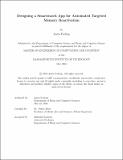Designing a Smartwatch App for Automated Targeted Memory Reactivation
Author(s)
Podrug, Anita
DownloadThesis PDF (630.8Kb)
Advisor
Maes, Pattie
Terms of use
Metadata
Show full item recordAbstract
Targeted Memory Reactivation (TMR) experiments have shown potential in enhancing learning and memory by pairing sensory stimuli with specific memories during learning and reintroducing these stimuli during slow-wave sleep. This process aids in memory consolidation, where recent neural representations are reactivated and transferred to long-term storage. Traditionally, TMR has been limited to laboratory settings. For my thesis, I developed a TMR system usable at home and investigated the effectiveness of this system on memory recall of a nature documentary, using vibration as a stimulation cue. I developed a machine-learning model that performs sleep stage classification from heart rate and motion data that can be collected from a smartwatch in real-time. Using this model, the smartwatch was programmed to deliver TMR cues when participants enter stage N3 (slow-wave) sleep. This TMR system was found to improve recall 24 hours and 1 week after the initial learning, but the results were not found to be statistically significant due to an insufficient amount of data. Further studies would be required to confirm these results. This advancement of at-home TMR can be extremely useful for further understanding sleep’s role in memory and can provide a system to be used by the general public for improving their learning and memory. Additionally, the development of an automated real-time sleep-stage classification model can enable more reliable and better quality experiments to be used on a variety of sleep studies in the future.
Date issued
2024-05Department
Massachusetts Institute of Technology. Department of Electrical Engineering and Computer Science; Massachusetts Institute of Technology. Department of Brain and Cognitive SciencesPublisher
Massachusetts Institute of Technology